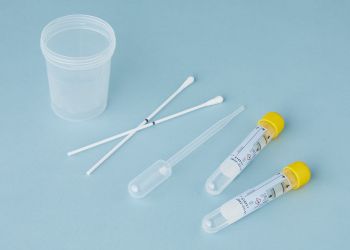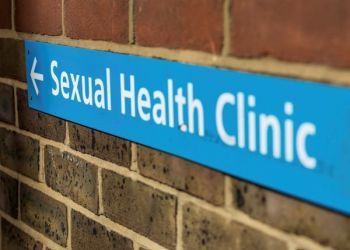STI Express Initiative
With funding from the CDC’s Division of STD Prevention (DSTDP), NACCHO leads the STI Express Initiative, which is designed to increase the evidence base for express STI clinical visits and support clinics in quality improvement efforts to strengthen, scale-up, and evaluate STI express models. We define STI express services as triage-based STI testing without a full clinical examination. Express services, also known as “fast-tracking,” are often associated with technology and automation and can reduce visit time, decrease time to treatment, and free up provider time; empower use of staffing models that utilize top of license strategies; enable self-collection of swabs; and increase opportunities to implement in diverse settings.
The STI Express Initiative has a number of components, including a Community of Practice with clinics that currently implement or are interested in implementing express STI visits, in-depth assessments with three sites to strengthen operational plans for STI express models, and a Data Collaborative through seven STI clinical sites will evaluate their express models across common variables.
The materials below include conference posters and slides from from the 2020 National Ryan White Conference on HIV Care & Treatment.
Resources for Express STI Services
A one-stop shop for tools and resources on planning, implementing, and evaluating express STI services
As part of the STI Express Initiative, clinics implementing express services across the country have shared resources, protocols, and guidelines to help others design and implement their own express models. Check out the resources by topic below.
This list is non-exhaustive and does not necessarily represent the current protocol at specified clinics. To learn more about a listed resource or to submit your own resource for publication on our website, please contact Julia Zigman at [email protected].
An important aspect of planning express STI services is determining a clinic flow and assigning staff roles. See below for examples* of flowcharts and work grids from clinics participating in the STI Express Initiative.
- NYC Clinic Flow
- Seattle Clinic Flowchart
- Oakland County Fast Track Algorithm / Clinic Flow
- Orange County CA - Quick Check Algorithm and Clinic Flow
Work Grids and Staff Descriptions
- Oakland County Fast Track Triage Nurse Roles and Responsibilities
- Denver STD Clinic Standard Work Grid
*(This list is non-exhaustive and does not necessarily represent the current protocol at specified clinics. To learn more about a listed resource, contact Julia Zigman at [email protected]).
While piloting and implementing express services, ongoing data collection is crucial to understanding the role of express in reaching your clinic’s goals and populations. Monitoring and evaluation (M&E) of key indicators can help your clinic continuously improve service delivery, make decisions about service prioritization, and contribute to the growing body of evidence about the effectiveness of express models. The resources below were used to evaluate clinics in the STI Express Initiative: Data Collaborative and can be adapted to support your M&E efforts.
Evaluation Framework
- Data Dictionary
- Data Collaborative Evaluation Framework
- Data Checklist Evaluation Framework Supplement
Patient Satisfaction
Appropriately triaging patients is critical to detecting infection and ensuring that limited clinic resources are utilized efficiently. Each clinic has its own criteria to determine which patients are eligible for express services. Below are multiple triage and intake forms utilized* by clinics implementing express STI services.
- NYC STI Express Triage Card
- Denver Triage Protocol
- Mississippi Express Personal Health Clinic Intake Survey
- Mississippi - ExpressPersonalHealth Encounter Survey - Health Assessment
- Miriam Clinic STD Intake Form
- Orange County Quick Check Check In Slip - Intake
- Orange County Regular Visit Check In Slip - Intake
*(This list is non-exhaustive and does not necessarily represent the current protocol at specified clinics. To learn more about a listed resource, contact Julia Zigman at [email protected]).
Did you know? The majority of clinics that offer express services utilize self-collection of samples.
Self-collection of specimens has multiple clear benefits for clients and providers. There is strong evidence that patients are able to successfully collect samples by themselves, given proper instructions. Evidence also shows high patient satisfaction, with patients finding self-collection easy and comfortable. Because
express patients don’t see providers, most clinics implement self-collection protocols for swabs and urine for gonorrhea and chlamydia and have another provider collect serum for HIV and syphilis.
Read more about self-collection in our guide, Implementing Express STI Services: Considerations and Lessons Learned, and using the below resources.
Test Yourself: The Visual Guide for a Self-collected Swab
The University of Washington (UW) STD Prevention Training Center (PTC) provides free, high-quality prints (e.g., posters, small guides) of their pharyngeal, rectal, and vaginal self-testing visual aids. Visit the UW PTC website to learn more about these resources.
To order, please email [email protected] and include the quantity of each size and type desired with your shipping address.
Samples:
- UW: Vaginal Swab for STD Self-Test Handout Sample (English)
- UW: Vaginal Swab for STD Self-Test Handout Sample (Spanish)
- UW: Rectal Swab for STD Self-Test Handout Sample (English)
- UW: Throat Swab for STD Self-Test Handout Sample (English)
California Prevention Training Center (PTC) Self-Swab Instructional Posters
Written Instructions Samples
Billing remains a challenge for many STI clinics, and billing for STI express services is no exception. NACCHO developed an STI express billing fact sheet to support clinics that already bill for services to consider how they might also bill for express services. This resource includes guidelines on billing for a variety of providers, when to use specific codes, and other tips. Clinic staff and others can learn more at the below resources or in our considerations guide.
NACCHO STI Express Initiative Billing Companion Guide
Other Resources
Community Health Program
Julia Zigman
Senior Program Analyst, HIV
JavaScript is required to reveal this message. / Email




